
Headless CMS scales and improves WPWhiteBoard’s content distribution, flexibility, and personalization
Tired of rigid platforms? Kibo Commerce is the unified solution that ends operational silos. Discover how its headless, composable architecture delivers true B2B agility and growth.
Type
E-commerce
Founded
2016
Website
kibocommerce.com
Technology / Kibo Commerce: MACH-Certified Composable Commerce…

An outdated e-commerce platform creates more operational problems than it solves.
The pressure to innovate has never been higher. Still, your technology stack feels more like an anchor than an engine, holding you back whenever you try to launch a new experience or integrate a critical tool.
You know you need to move faster, but your traditional system turns every small step into a monumental project.
Kibo Commerce is a composable platform that unifies eCommerce, order management, and AI-driven personalization for B2B and B2C businesses.
Its headless, modular architecture provides the essential flexibility and scalability to build and adapt.
Learn precisely how Kibo’s unified commerce platform and next-generation Agentic AI solve the core challenges of operational silos and innovation roadblocks.
So, what is Kibo e-commerce? The Kibo Commerce platform is an answer to the frustrations of legacy technology. It’s a modern, cloud-native foundation built specifically to help businesses break free from the constraints of rigid, all-in-one systems.
Unlike the traditional platforms of the past that lock you into a single way of doing things, Kibo is designed for flexibility from the ground up.
Think of it as a strategic shift in how you approach your digital operations. Instead of a single, cumbersome block of technology, the Kibo e-commerce platform provides a set of powerful, interconnected, and independent commerce services.
This includes everything from the customer-facing storefront and cart to the back-end order management and personalization engines.
The core philosophy is simple: give you, the technology leader, the control to build what you need, when you need it, without having to rip and replace your entire system.
It’s a unified commerce platform designed not just to sell products online, but to create a cohesive operational backbone that supports your business today and can scale with you into the future.
You’ve likely heard the term "headless commerce" thrown around.
It’s one of those industry buzzwords that can feel more confusing than helpful, but the concept behind it is a powerful solution to the exact problem you’re facing: the inability to move quickly.
In a traditional platform, the front-end (the "head," or what your customer sees and interacts with) is permanently fused to the back-end (the commerce engine, inventory, and business logic).
This tight coupling is why making a simple change to the customer experience can feel like performing open-heart surgery on your entire operation.
Everything is tangled together.
A headless commerce platform decouples them. It separates the presentation layer from the functional core. This simple separation is a complete game-changer for agility.
Suddenly, your marketing and development teams are free. They can build unique, engaging customer experiences on any framework or technology they choose.
They can launch a new mobile app, a custom in-store kiosk, an IoT device, or a lightning-fast new website without being constrained by the back-end templates.
All of these different "heads" simply talk to the same powerful commerce engine via APIs.
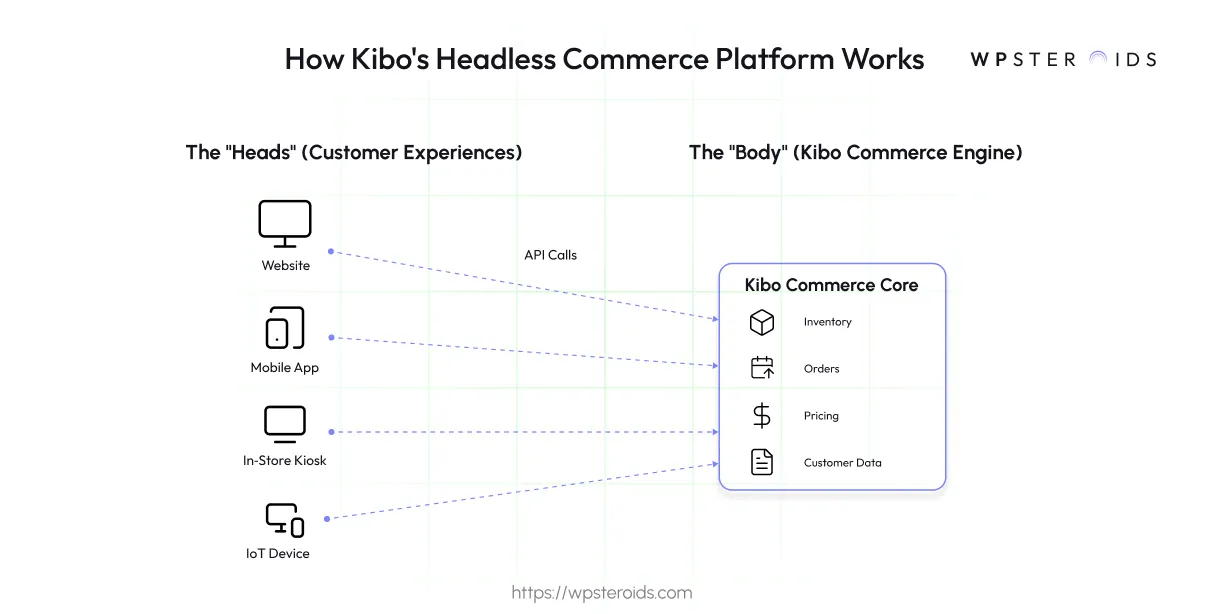
This means you can innovate at the speed your business demands.
Features are only as good as the problems they solve.
For a technology leader like you, the most important features are the ones that give your team the power to execute the business's vision without being hamstrung by technology.
Kibo’s core platform is built around a set of foundational capabilities designed to do exactly that.
Your current platform is likely a traditional, single, rigid block where every component is interdependent.
Kibo is the exact opposite. It’s built on a modular, composable architecture.
Think of it like building with LEGOs instead of being handed a pre-built, glued-together model car.
With Kibo, each piece of the commerce puzzle—product catalogs, pricing, inventory, promotions—is an independent "module" or "microservice."
This means you can pick and choose the exact capabilities you need and swap out a single module without having to dismantle your entire operation.
This composable approach gives you the ultimate flexibility to build the exact stack your business requires.
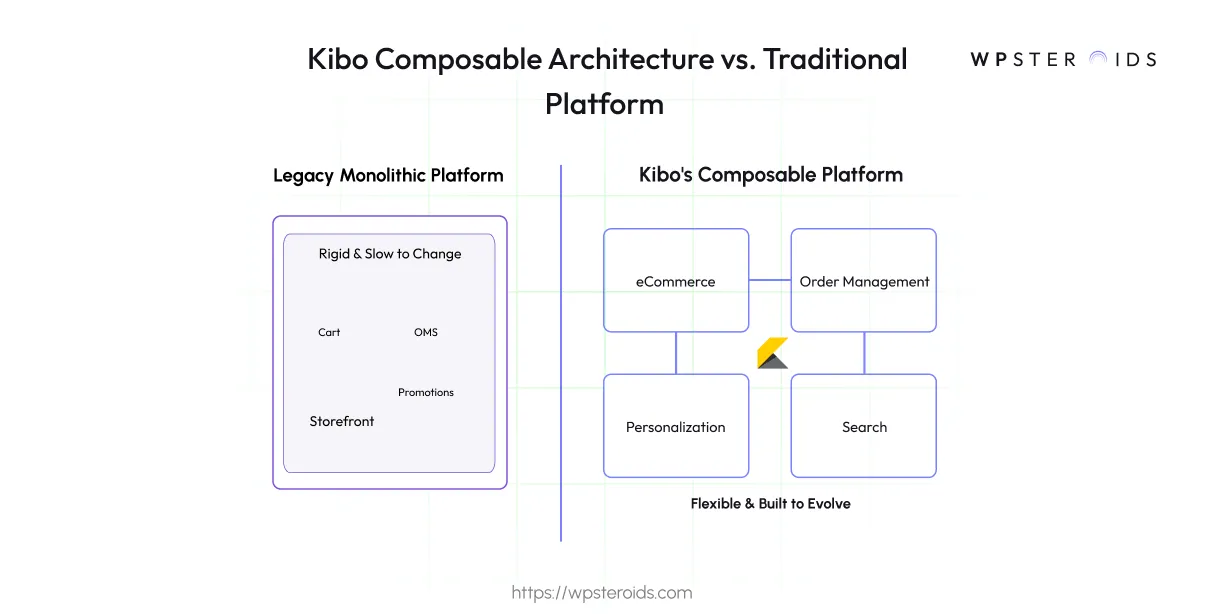
If "composable architecture" is the what, then "API-first" is the how.
Every single function and piece of data within the Kibo platform is accessible via a robust API. This wasn't an afterthought; it's the core design principle.
For you, this directly solves integration headaches.
The API-first design ensures that all your systems can communicate seamlessly, sharing data in real-time.
This allows you to create a truly connected technology ecosystem, breaking down the data silos that currently make a unified view of your business impossible.
Many platforms claim to serve both B2B and B2C customers, but they are often B2C platforms with a few B2B features bolted on as an afterthought.
Kibo Commerce was designed from the ground up to handle the deep complexities of both business models within a single platform.
It natively supports sophisticated B2B requirements like customer-specific pricing, tiered accounts, complex product catalogs, quote management, and purchase order workflows.
You can manage your entire Kibo commerce for B2B and D2C operations from a single place, with a unified view of customers, orders, and inventory.
A flexible architecture is great, but what does it do for your business? This is where Kibo’s design principles translate directly into tangible, bottom-line benefits.
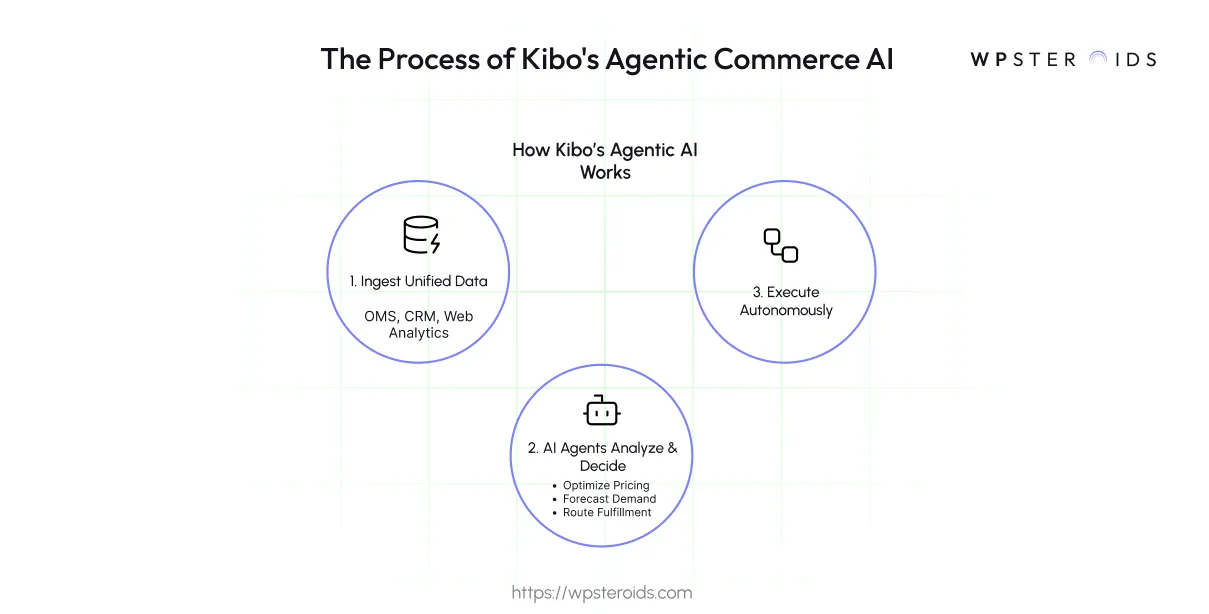
Think about the last time your marketing team came to you with a great idea. Was your gut reaction excitement or a quiet dread, knowing the project would take months?
With Kibo Commerce, you can change that narrative. Because the front-end is decoupled from the back-end, your teams can work in parallel.
A new microsite, a mobile app update, or an experimental landing page can be designed and deployed in a fraction of the time.
This allows you to say "yes" to the business more often, moving from a department of roadblocks to one of rapid execution.
Your customers don't see channels; they just see your brand. They expect a seamless omnichannel commerce experience, but you know that siloed systems make delivering this a nightmare.
Kibo’s unified platform dissolves those silos. By centralizing customer data, orders, and inventory from every touchpoint into a single source of truth, you can finally deliver the fluid experiences customers demand.
This isn't a patched-together solution; it's a foundational capability that turns a chaotic, multi-channel mess into a cohesive and elegant customer journey.
Your current platform probably has you worried. Will it hold up during the Black Friday rush? What happens when technology changes and you’re locked into an outdated system?
Kibo is built to provide that peace of mind. As a cloud-native platform, it automatically scales to handle massive peaks in traffic.
More importantly, its composable nature means your tech stack can evolve. As new technologies emerge, you can adapt your system piece by piece, ensuring you’re never again trapped by a single vendor’s roadmap.
When we talk about a "unified platform", it means Kibo is designed to be the central hub for your entire commerce operation, replacing the collection of disconnected systems you’re likely struggling with today.
Imagine your current operation is a restaurant with three separate kitchens for online, in-store, and back-office tasks. The result is chaos.
Kibo’s unified platform is like a single, state-of-the-art, open-plan kitchen. As the Head Chef, you have a single, real-time view of everything. Every order, every piece of inventory, and every customer interaction is visible on one dashboard.
The chaos is gone, replaced by clarity and control.
This unified operation is made possible by Kibo’s core service pillars:
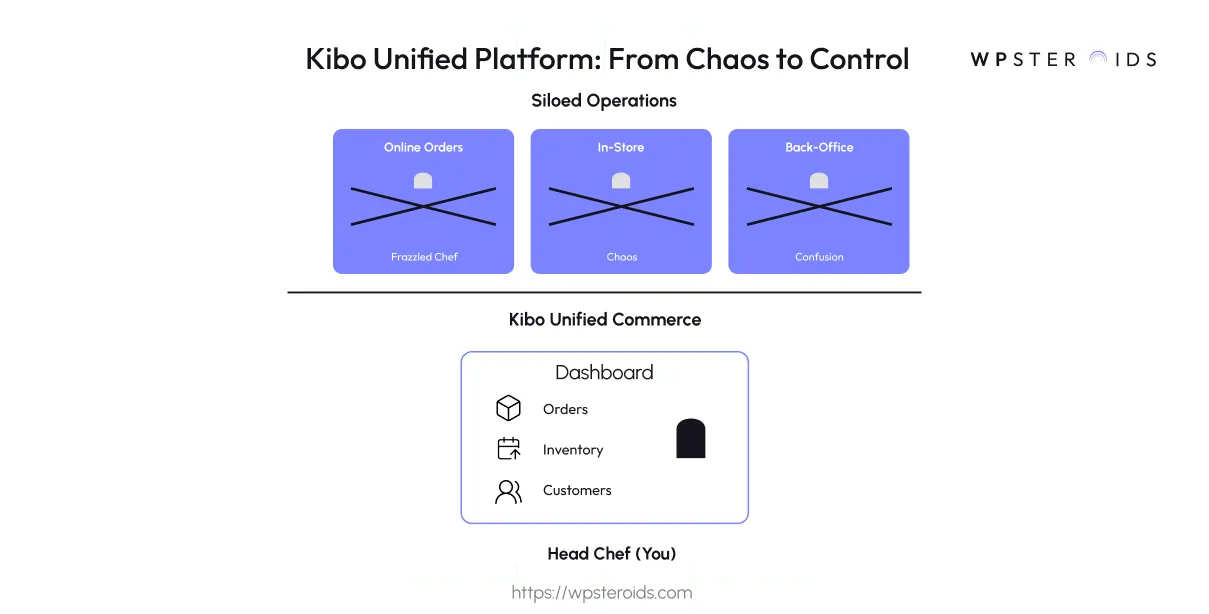
If you stop at headless and composable, you’re only seeing half the picture. The real transformation comes from the intelligence that runs on top of them.
This is where Kibo is making a strategic leap beyond its competitors, especially in the complex world of B2B commerce.
The conversation in the industry is evolving. While competitors are still focused on explaining flexibility, Kibo is pioneering what comes next: agentic operations.

This isn't just about making your platform more flexible. It's about making your entire operation more intelligent and self-sufficient.
It’s a key reason why the answer to "Is Kibo Commerce good for B2B?" is a resounding yes.
Your customers now expect a level of smart, predictive, and helpful interaction that can only be delivered by AI.
Kibo addresses this head-on by building its powerful e-commerce personalization engine directly into the core of the platform.
It's a native capability that leverages all of your unified data to create genuinely personalized experiences for both B2C and B2B users.
A platform can have the most flexible foundation in the world, but if its core functions are clunky, you’ll just be trading one set of problems for another.
Kibo provides a comprehensive suite of functions designed for modern business complexities.
A platform is only as strong as the businesses that trust it. Kibo is trusted by a diverse range of leading B2C and B2B brands that require a sophisticated, scalable, and unified solution.
It’s worth noting that Kibo Commerce is owned by Vista Equity Partners, a leading global investment firm that focuses on enterprise software. This provides Kibo with deep financial stability and a strong backing for continued innovation.
The brands that rely on Kibo often have complex operational needs.
Here are just a few examples of who uses Kibo Commerce:
The fashion and apparel industry is another area where Kibo excels.
Fashion retailers grapple with rapidly changing collections, complex product variants, and customers who demand seamless omnichannel journeys.
Kibo's unified platform is uniquely suited to solve these problems. Its powerful order management system can handle complex inventory logic, while its headless architecture allows brands to create rich, visual, and content-driven experiences.
Kibo Commerce case studies for fashion retail share a common theme: Kibo provides the agile foundation needed to keep up with the fast-paced nature of the industry.
Let's tackle three of the most important questions head-on: customization, omnichannel support, and global readiness.
The short answer is: extremely customizable.
Because every piece of data and functionality is exposed via an API, your development team has the power to extend, modify, and integrate Kibo to meet your unique business processes without fighting the platform.
Yes, absolutely. True omnichannel is only possible with a unified commerce platform, and Kibo’s centralization of all orders, inventory, and customer data solves this at the core level.
Likewise, Kibo is inherently a headless commerce platform, giving your team the freedom and agility to create best-in-class experiences on any channel.
Kibo is architected to handle the complexities of international sales with a suite of built-in capabilities:
Now we come to the practical realities: How much does it cost, and what does it take to get it running?
One of the biggest frustrations with enterprise software is unpredictable pricing based on Gross Merchandise Value (GMV).
This provides a far more predictable and scalable path for managing your Kibo Commerce total cost of ownership, which is a game-changer for B2B companies.
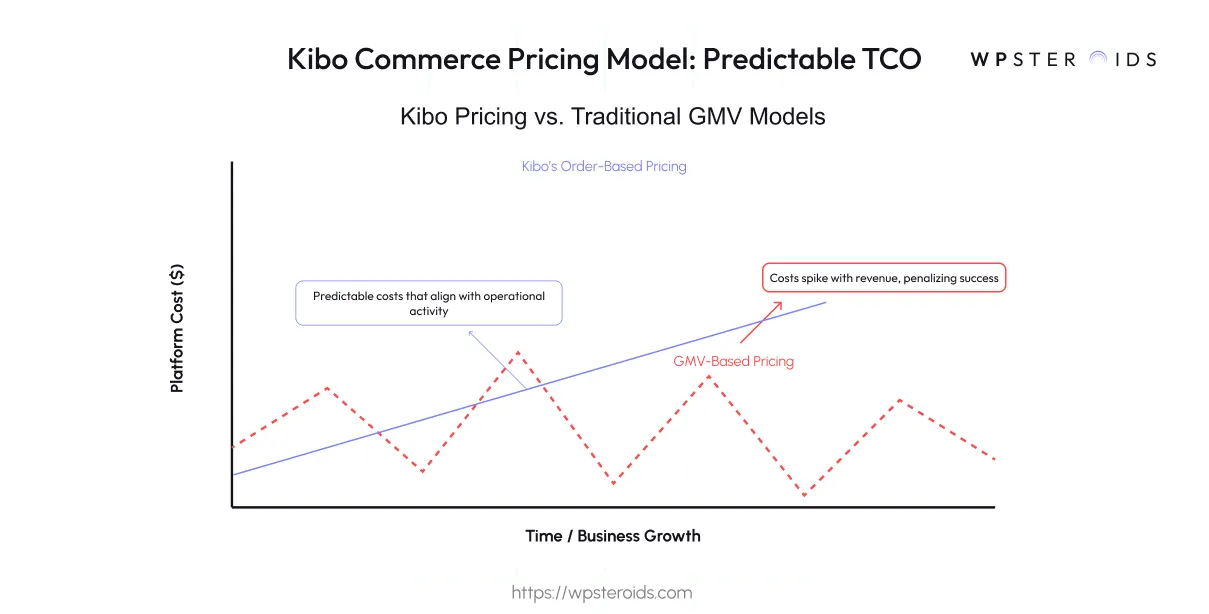
So, how is Kibo Commerce deployed? As a modern, cloud-native solution, Kibo is delivered as a Software-as-a-Service (SaaS) platform.
This means Kibo handles all hosting, infrastructure, and security for you.
The implementation process itself is a collaborative partnership that typically involves:
Because of Kibo’s modular nature, you have the flexibility to phase your deployment, allowing you to start delivering value quickly.
The journey from a rigid, traditional platform to a modern commerce engine can feel daunting, but the path forward is clearer than ever.
Kibo Commerce represents a fundamental strategic shift—a move away from chaotic, siloed operations and toward a unified, intelligent, and future-proof system designed for growth.
You are no longer held hostage by your technology. Kibo Commerce offers the most intelligent and complete solution to dismantle operational silos, reclaim business agility, and drive real, measurable growth.
The road ahead doesn't have to be another series of compromises. It can be a path of confident, strategic execution.
See how a unified, AI-powered platform can transform your business. Book your discovery call today.
Discover how brands are fueling success with a MACH-based digital architecture.